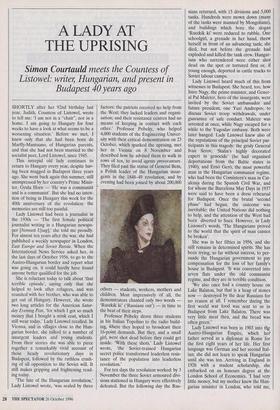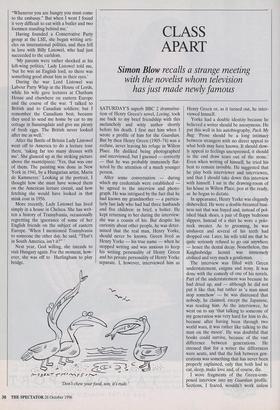A LADY AT THE UPRISING
Simon Courtauld meets the Countess of
Listowel: writer, Hungarian, and present in Budapest 40 years ago
SHORTLY after her 92nd birthday last year, Judith, Countess of Listowel, wrote to tell me: 'I am not in a "chair", nor in a home. I am going to Hungary for four weeks to have a look at what seems to be a worsening situation.' Before we met, I knew only that she had been born de Marffy-Mantuano, of Hungarian parents, and that she had not been married to the socialist peer, Lord Listowel, since 1945.
This intrepid old lady continues to return to Hungary every year, despite hav- ing been mugged in Budapest three years ago. She went back again this summer, still unimpressed by her country's Prime Minis- ter, Gyula Horn — 'He was a communist and is a communist'. But she had no inten- tion of being in Hungary this week for the 40th anniversary of the revolution: the memories are still too painful.
Lady Listowel had been a journalist in the 1930s — 'The first female political journalist writing in a Hungarian newspa- per [Nemseti Ujsag],' she told me proudly. For almost ten years after the war, she had published a weekly newspaper in London, East Europe and Soviet Russia. When the International News Service asked her, in the last days of October 1956, to go to the Austro-Hungarian border and report what was going on, it could hardly have found anyone better qualified for the job.
She is reluctant today to talk about 'that terrible episode', saying only that she helped to look after refugees, and was reunited with her brother, who was able to get out of. Hungary. However, she wrote two long articles for the American Satur- day Evening Post, 'for which I got so much money that I bought a mink coat, which I still wear today,' Lady Listowel recalled. In Vienna, and in villages close to the Hun- garian border, she talked to a number of insurgent leaders and young students. From their stories she was able to piece together a remarkably vivid account of those heady revolutionary days in Budapest, followed by the ruthless crush- ing of all opposition to the Soviet will. It still makes gripping and frightening read- ing today.
`The fate of the Hungarian revolution,' Lady Listowel wrote, 'was sealed by three factors: the patriots received no help from the West; they lacked leaders and organi- sation; and their resistance centres had no means of keeping in contact with each other.' Professor Pribeky, who helped 4,000 students of the Engineering Univer- sity with their critical demonstration on 23 October, which sparked the uprising, met her in Vienna on 8 November and described how he advised them to walk in rows of ten, to avoid agents provocateurs. They filed past the statue of General Bern, a Polish leader of the Hungarian insur- gents in the 1848-49 revolution, and by evening had been joined by about 200,000 others — students, workers, mothers and children. Most impressively of all, the demonstrators chanted only two words — auszkik Id' (`Russians out') — in time to the beat of their steps.
Professor Pribeky drove three students in his Italian Topolino to the radio build- ing, *here they hoped to broadcast their 16-point demands. But they, and a small girl, were shot dead before they could get inside. 'With these shots,' Lady Listowel wrote, 'the Soviet-trained Hungarian secret police transformed leaderless resis- tance of the population into leaderless revolution.'
For ten days the revolution worked: by 3 November the three Soviet armoured divi- sions stationed in Hungary were effectively defeated. But the following day the Rus- sians returned, with 15 divisions and 5,000 tanks. Hundreds were mown down (many of the tanks were manned by Mongolians), and buildings which bore the slogan auszldk ki' were reduced to rubble. One schoolgirl, a grenade in her hand, threw herself in front of an advancing tank; she died, but not before the grenade had exploded and killed the tank crew. Hungar- ians who surrendered were either shot dead on the spot or tortured first or, if young enough, deported in cattle trucks to Soviet labour camps.
Lady Listowel heard much of this from witnesses in Budapest. She heard, too, how Imre Nagy, the prime minister, and Gener- al Pal Maleter, hero of the insurgents, were invited by the Soviet ambassador and future president, one Yuri Andropov, to discuss Soviet troop withdrawals, under guarantee of safe conduct. Maleter was arrested at once, while Nagy escaped for a while to the Yugoslav embassy. Both were later hanged. Lady Listowel knew also of the reputations of the principal Soviet par- ticipants in this tragedy: the grisly General Ivan Serov, 'Stalin's highly decorated expert in genocide' (he had organised deportations from the Baltic states in 1940), and ErnO Gero, the most powerful man in the Hungarian communist regime, who had been the Comintem's man in Cat- alonia during the Spanish Civil War, and for whom the Barcelona May Days in 1937 were said to have been a dress rehearsal for Budapest. Once the brutal 'second phase' had begun, the outcome was inevitable; the United Nations did nothing to help, and the attention of the West had been diverted to Suez. However, in Lady Listowel's words, 'The Hungarians proved to the world that the spirit of man cannot be broken'.
She was in her fifties in 1956, and she still remains in determined spirits. She has been trying, so far without success, to per- suade the Hungarian government to pay compensation for the loss of her family's house in Budapest. 'It was converted into seven flats under the old communist regime, and they are in terrible condition.
`We also once had a country house on Lake Balaton, but that is a heap of stones now — destroyed by the dear Russians for no reason at all. I remember during the first world war food was sent to us in Budapest from Lake Balaton. There was very little meat then, and the bread was often green.'
Lady Listowel was born in 1903 into th, Austro-Hungarian Empire, which her father served as a diplomat in Rome for the first eight years of her life. Her first language was German and her second Ital- ian; she did not learn to speak Hungarian until she was ten. Arriving in England in 1926 with a student scholarship, she embarked on an honours degree at the London School of Economics. 'I had very little money, but my mother knew the Hun- garian minister in London, who told me, "Whenever you are hungry you must come to the embassy." But when I went I found it very difficult to eat with a butler and two footmen standing behind me.'
Having founded a Conservative Party group at the LSE, she began writing arti- cles on international politics, and then fell in love with Billy Listowel, who had just succeeded to the earldom.
`My parents were rather shocked at his left-wing politics,' Lady Listowel told me, `but he was an English lord, so there was something good about him in their eyes.'
During the war Lord Listowel was Labour Party Whip in the House of Lords, while his wife gave lectures at Chatham House and elsewhere on eastern Europe and the course of the war. 'I talked to British and to Canadian soldiers; but I remember the Canadians best, because they used to send me home by car to my cottage in Sunningdale and give me plenty of fresh eggs. The British never looked after me as well.'
After the Battle of Britain Lady Listowel went off to America to do a lecture tour there, 'taking far too many dresses with me'. She glanced up at the striking picture above the mantelpiece: 'Yes, that was one of them. The painting was done in New York in 1941, by a Hungarian artist, Maria de Kammerer.' Looking at the portrait, I thought how she must have wowed them on the American lecture circuit, and how fetching she would have looked in that mink coat in 1956.
More recently, Lady Listowel has lived simply in a house in Chelsea. She has writ- ten a history of Transylvania, occasionally regretting the ignorance of some of her English friends on the subject of eastern Europe. 'When I mentioned Transylvania to someone the other day, he said, "That's in South America, isn't it?" ' Next year, God willing, she intends to visit Hungary again. For the moment, how- ever, she was off to Hurlingham to play bridge.



















































































 Previous page
Previous page